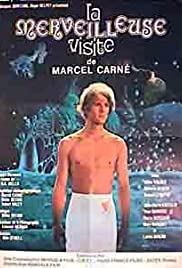
LA VISITE MERVEILLEUSE (THE WONDERFUL VISIT)
France, 1974, 100 minutes, Colour.
Gilles Kohler, Roland Lesaffre, Deborah Berger.
Directed by Marcel Carne.
The main reason for seeing this small-budget fantasy is that it was directed by celebrated French director Marcel Carne. After this film his only other one was a visual documentary on the Bible. However, in the late 1930s and during the 1940s he was one of the most celebrated of French directors with: Quai des Brumes, Hotel du Nord, Le Jour se Leve, Les Visiteurs du Soir and The Children of Paradise.
This is a film about a mysterious young man who appears on a beach, seems to be an angel, is completely other-worldly – and is introduced into the world by the local parish priest and the other citizens of the town.
This story of innocence is based on a tale by H.G. Wells. The film asks us to believe in the reality of this kind of child-angel, innocent – and the effect on the people in the village, especially the parish priest who is devoted to the angel. His own life is transformed for the better.
1. To what genre did this film belong? Realism, fantasy? Moral fable? Religious film?
2. The origins of the story in H.G. Wells? His preoccupation with this world, the world beyond? His religious and nonreligious stances? The supernatural entering the natural world? H. G. Wells and science fiction fantasy? A French adaptation of an H. G. Wells story? How successful the crossing of the English Channel?
3. A film of the 1970's? The popularity of fantasies in previous decades? The impact on audience to see this world challenged by an outside world? Strongly, the light touch? The universal appeal of this kind of fable and fantasy?
4. The significance of the title and the focus on the angel, the people visited, the wonder of it? The impact of the opening? Jean, the angel, his presence, the effect? Setting the tone for the rest of the film - establishing the credibility of the fable? How willingly did the audience enter into the conventions of the fantasy?
5. Themes of incarnation of spirits, the background of angels, audience expectations, of angels? Angels in a 20th century French village? Angels in religious fantasy? The purpose of the angel as a messenger of God? The contradictions in angels, the challenges and contradictions for human beings? For and against? The changing into
love, hatred?
6. The focus on the priest, his assistant? The basic goodness of the priest, his official Church background, the rescuing of the angel, looking after him? The bonds? How did this compare with the attitude of the other villagers? The range of response? The maid and her devotion?
7. How credible a character was Jean? The fact that he was an angel, his explanation? His appearance, age, physical appearance, beauty? His appearing nude? The blanket? The comparison with earthly behaviour and his learning it? The contrast between ordinary human beings and the angel? Such sequences involving the music, the sweets and not paying, his not knowing how to act?
8. The priest and the change in his life? His devotion to Jean, saving him especially with the sweets, the painting of the house, the music?
9. The assistant and his being basically good, his jealousy, watching the angel, the sequence with the boat, saving and betraying? The contradictions of response of human beings to the transcendent?
10. The girl and her character, her place in the village, the reason that she was transformed by Jean's presence? Platonic love? The response of her boy friend, Jean's liking him, his suspicions? The incident with the truck? The injury and what was made of it? The building up of suspicion, fear, hatred and the background, the lynching?
11. The presentation of the countess, her fascination with Jean, the staging of the play? The effect of the angel on her life?
12. The child, innocence, the innocence of the angel?
13. The difficulties of Jean's surviving in this village, misunderstandings, the tavern sequences, the build-up to the lynching? Even to the shooting? The visual presentation of the hunt and audience emotion at this time?
15. Jean's escape, the symbol of the bird and its flying free?
16. The realism of the presentation of the village and its people, the significance of this kind of realism, as a setting for the mystical? The capacity of film to suggest mystical and evocative symbolic meaning in such a fable?